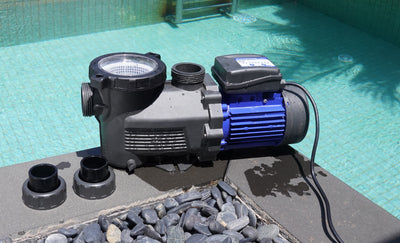Liquid Chlorine vs. Chlorine Granules: Which Is Best for Your Pool?
When it comes to pool care, one of the most important decisions you'll face is choosing the right chlorine to sanitize your pool. Should you use liquid chlorine or chlorine granules? Both are effective, but they have different advantages and drawbacks. Let's break down the differences between liquid chlorine and chlorine granules to help you make the best choice for your pool.
How Chlorine Works to Keep Your Pool Clean
Chlorine is essential for pool maintenance because it kills harmful bacteria, viruses, and algae, keeping your water clean and safe. It works by breaking down the cell walls of microorganisms, oxidizing them, and rendering them inactive. This process is effective regardless of the form of chlorine you use—whether liquid or granules.
However, chlorine doesn’t last forever. It gradually breaks down as it sanitizes, which is why regular chlorination is required to maintain safe water levels.
Liquid Chlorine
Liquid chlorine is a popular option, especially for large pools or commercial settings. It’s simple to use—just pour it directly into the pool—and works quickly. Here’s what you need to know:
-
Advantages: Liquid chlorine has a high concentration of chlorine and is typically more affordable than some other forms. It’s ideal for larger pools and is often used in commercial pools or high-traffic pools where large volumes of chlorine are needed.
-
Disadvantages: Liquid chlorine has a very high pH (around 13), meaning you'll need to add more acid to your pool to balance the water chemistry. It’s also highly corrosive, which can damage your pool surfaces if not handled carefully. For residential pools, the cost of managing the high pH may outweigh the benefits, particularly if you have a smaller pool.
-
Best For: Large pools, commercial pools, and situations where you need to add a significant amount of chlorine quickly.
Chlorine Granules
Chlorine granules are one of the most common forms of chlorine used in residential pools. They’re easy to apply, dissolve quickly, and are more convenient for regular maintenance. There are two main types of chlorine granules: Dichlor and Calcium Hypochlorite (Cal-Hypo).
Dichlor
-
Advantages: Dichlor has a lower pH (around 7) compared to liquid chlorine, which means you won’t need to use as much acid to maintain proper water balance. It dissolves quickly and begins working immediately to kill contaminants. Dichlor is also stabilized, making it suitable for pools that get a lot of sunlight, as it resists UV breakdown.
-
Disadvantages: It’s more expensive than other forms of chlorine, but it’s effective in smaller pools and saltwater pools.
-
Best For: Smaller pools, saltwater pools, or pools with heavy sunlight exposure.
Calcium Hypochlorite (Cal-Hypo)
-
Advantages: Calcium hypochlorite is a cost-effective option that contains a high level of chlorine (about 65%) per pound. It works well as a shock treatment for clearing up algae blooms or cloudy water. It’s widely available and is commonly used by residential pool owners for regular maintenance.
-
Disadvantages: Cal-Hypo has a high pH (around 12), meaning it requires additional acid to balance the water. It’s also unstable, and inhaling its fumes can be harmful, so proper handling is crucial.
-
Best For: Budget-conscious pool owners who need a strong sanitizer for shock treatment or regular chlorination.
Liquid Chlorine vs. Chlorine Granules: Which One Should You Choose?
Both liquid chlorine and chlorine granules have their advantages. The choice depends on factors like pool size, budget, and the amount of time you want to spend on maintenance.
-
Liquid Chlorine may be the better choice if you have a large pool or commercial setup where you need to add chlorine in bulk. However, the high pH can be a challenge for smaller pools.
-
Chlorine Granules are more convenient for residential pool owners. If you’re looking for a more affordable option and have a smaller pool, granules are an excellent choice. They are also easier to store and handle compared to liquid chlorine.

